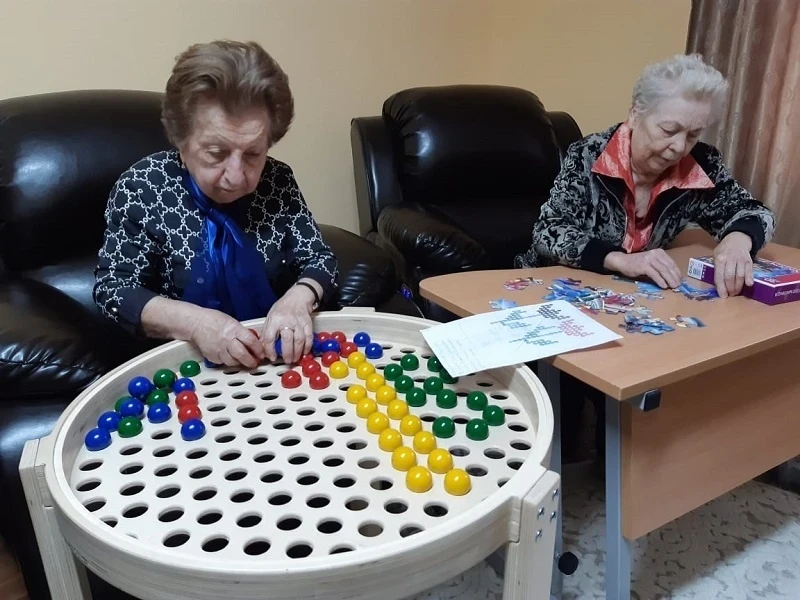Scientists have found that a lack of free time increases the risk of dementia
Epidemiologist Suzanna Rör noted: "Up to 45% of dementia cases worldwide could be prevented if we could eliminate modifiable risk factors. However, many do not have the time to exercise, maintain a sleep schedule, eat properly, and sustain social connections."
The researchers termed this issue "time poverty," which acts as an invisible barrier to caring for brain health and reducing the risks of dementia. The fast pace of life, professional pressure, and caring for loved ones often rob people of the opportunity to prioritize their health.
According to the scientists, time inequality affects women and low-income individuals the most: women often bear the primary burden of caregiving, while low-income individuals are forced to work more or on unstable schedules.
Psychologist Simona Reppemund emphasized: "For many, especially vulnerable groups, finding time for self-care becomes nearly impossible. If we want to prevent dementia, we need to combat time poverty."
As a solution to the problem, the authors of the study suggest developing a system of public support, improving the availability of childcare, implementing flexible work arrangements such as a four-day work week, enhancing public transport infrastructure, and guaranteeing the right to "digital disconnection" during non-working hours.
Neuropsychiatrist Perminder Sachdeva believes that time should be viewed as a social resource, and governments should combat time inequality as actively as they do income inequality.
The researchers warn that without systemic measures, the number of dementia cases worldwide will only continue to rise, particularly affecting vulnerable population groups.
Read also:

Men need to exercise twice as much as women to have a healthy heart
A study conducted by a group of scientists from China has shown that women engage in physical...
Scientists have determined how many steps elderly people need to take each day
A new study published in the British Journal of Sports Medicine debunks the myth that one must walk...
How Many Steps Are Needed for a Healthy Heart? A Study
According to a new study, older adults do not need to walk a large number of steps daily to improve...

Hidden fat, not excess weight — the real cause of cardiovascular diseases
According to the findings of the study, visceral fat located in the abdominal area and surrounding...
Surviving Winter Without Illness: Tips from a Therapist at the Family Medicine Center
The winter period poses a serious challenge for the immune system, as the lack of sunlight, cold...

Every year, 11 million people die from neurological disorders, - WHO
The WHO report on the state of neurological care worldwide states that over 3 billion people,...
Sharp pressure drops may be linked to accelerated brain aging, -study
A study conducted by specialists from the University of Southern California has shown that even...
In Kyrgyzstan, almost 70% of the population leads a sedentary lifestyle. Why is this bad?
According to a recent study, more than 68% of the population of Kyrgyzstan (specifically 68.3%) do...

Scientists: All Languages of the World Have Common Roots
Linguists from the USA and Britain compared the meanings of the most basic and simple words in 80...

A Simple Way to Improve Well-Being
A study conducted by scientists from the University of Texas at Arlington and Monash University...
Depression May Accelerate the Deterioration of Memory and Cognitive Functions - Study
In a study conducted by scientists from China, it was found that depressive states may contribute...
Early and Late Autism: Genetic Profiles and Their Impact on Development
Recent research has established that early and late diagnosis of autism is associated with...
Cybersecurity in Kyrgyzstan: Myths and the Truth That Businesses Must Live With
A few years ago, cybersecurity in Kyrgyzstan seemed like a distant and irrelevant issue. However,...

How Many Steps Are Needed for a Healthy Heart? Results of a New Study
A study has shown that older women who walked at least 4,000 steps one to two days a week had a...
Study: The Number of Cancer Cases Related to Obesity is Rising
A recent global study indicates an increase in cancer cases among youth worldwide, with obesity...

Scientists Propose a New Theory of Consciousness
For many years, two main theories dominated neuroscience: integrated information theory and global...
In Kyrgyzstan, about 20 thousand people die from heart diseases every year
According to information voiced on the air of "Birinchi Radio" by the head of the...
Mass Mutations Detected Among Uzbeks Due to Marriages Between Relatives
In Uzbekistan, the first large-scale study of the human genome in the country's history has...

Doctors of the Kyrgyz Republic propose increasing excise taxes on tobacco, alcohol, and sugary drinks
In Bishkek, a presentation of the investment justification dedicated to the prevention and control...
In Kyrgyzstan, 6,699 cases of ARVI registered in a week — an increase in morbidity has begun
From October 20 to 26, Kyrgyzstan recorded 6,699 cases of acute respiratory viral infections...

More and more Kyrgyz citizens are suffering from obesity.
In 14 years, the number of people in Kyrgyzstan whose weight significantly exceeds the norm has...
The Russian Drama Theater Opens Its Main Stage. But Only Temporarily
According to the information provided by the theater, the Days of Russian Culture in Kyrgyzstan...
In Alai, ten people died in two days: how are these traffic accidents related to each other?
On the highway Osh – Sary-Tash – Irkeshtam, two fatal incidents occurred within 48 hours, claiming...
The Pentagon allowed the White House to supply Ukraine with Tomahawk missiles, the decision is up to Trump.
According to information provided by CNN, citing sources in the U.S. and Europe, the Pentagon has...

Scientists have discovered a new powerful antibiotic against superbugs
This new antibiotic, methylenomycin A, was discovered over 50 years ago; however, the...
Scientists have found a molecule that helps the heart recover after a heart attack
A group of scientists from the Temple University School of Medicine (USA) has identified a new...
El Niño will become more powerful and dangerous by 2050, study finds
A group of international scientists reports on potential serious changes to the climate phenomenon...
One in Five Children in Kyrgyzstan Has Elevated Blood Lead Levels. Why Is This Dangerous?
According to the Republican Center for Health Promotion, 21% of children in Kyrgyzstan have blood...
Harmful for vulnerable groups. The air quality in Bishkek at 10:00 is 119 AQI (smog map)
As of 10:00 AM on October 22, 2025, the air pollution level in Bishkek is rated at 119 AQI. This...
In Uzbekistan, a woman was sentenced for dismembering her mother-in-law for dumplings and killing her husband.
According to information provided by local media, the woman was sentenced to 12 years and 3 months...

Mountain Sickness in Hiking and Ascents. Part 1
As soon as a person ascends into the mountains and overcomes a certain altitude barrier (usually...
Oil Traders: There Are Fuel Reserves in Kyrgyzstan, No Threat of Shortage
According to information provided by the president of the Association of Oil Traders, Kanat...
"We Are Not Interesting to Hackers." Myths about Cybersecurity in Kyrgyzstan
A few years ago, cybersecurity in Kyrgyzstan was perceived as something distant and insignificant....
Nobel Laureate in Economics Identifies Main Reasons for Declining Birth Rates Worldwide
Claudia Goldin, a Nobel Prize-winning economist, published a study analyzing the key reasons for...
In Kara-Balta, mothers of children with disabilities are asking for a space for classes and rehabilitation.
In Kara-Balta, women raising children with disabilities have appealed to the city administration...
The Bishkek City Hall strengthens control over electric scooters, mopeds, and taxis
The press service of the Bishkek mayor's office announced an increase in control over the...

AI has gone crazy from TikTok and clickbait. Scientists have discovered "brain rot" in neural networks.
As the research shows, when trained on low-quality data, neural networks begin to demonstrate a...
The incidence of ARVI in Kyrgyzstan is rising. Mainly children are getting sick.
According to information provided by the Department of Disease Prevention and State...
Media: Without a $1 Trillion Payout, Elon Musk May Leave Tesla
According to information provided by CNBC News, Elon Musk, the CEO of Tesla, may consider leaving...
Non-communicable diseases cost the economy of the Kyrgyz Republic nearly 30 billion soms
Non-communicable diseases (NCDs) inflict an economic loss of 29.8 billion soms on the economy of...
A new kindergarten is being built in the village of Shor-Bulak in the Ton District.
In the territory of the village of Shor-Bulak, located in the Ton district of the Issyk-Kul region,...

In Kyrgyzstan, they propose to open "kindergartens" for the elderly
At a recent conference dedicated to active longevity and the development of a new state program...

"Sary-Chelek Zone"
Sary-Chelek Zone ("yellow bowl") territorially coincides with the basin of the Khoja-Ata...